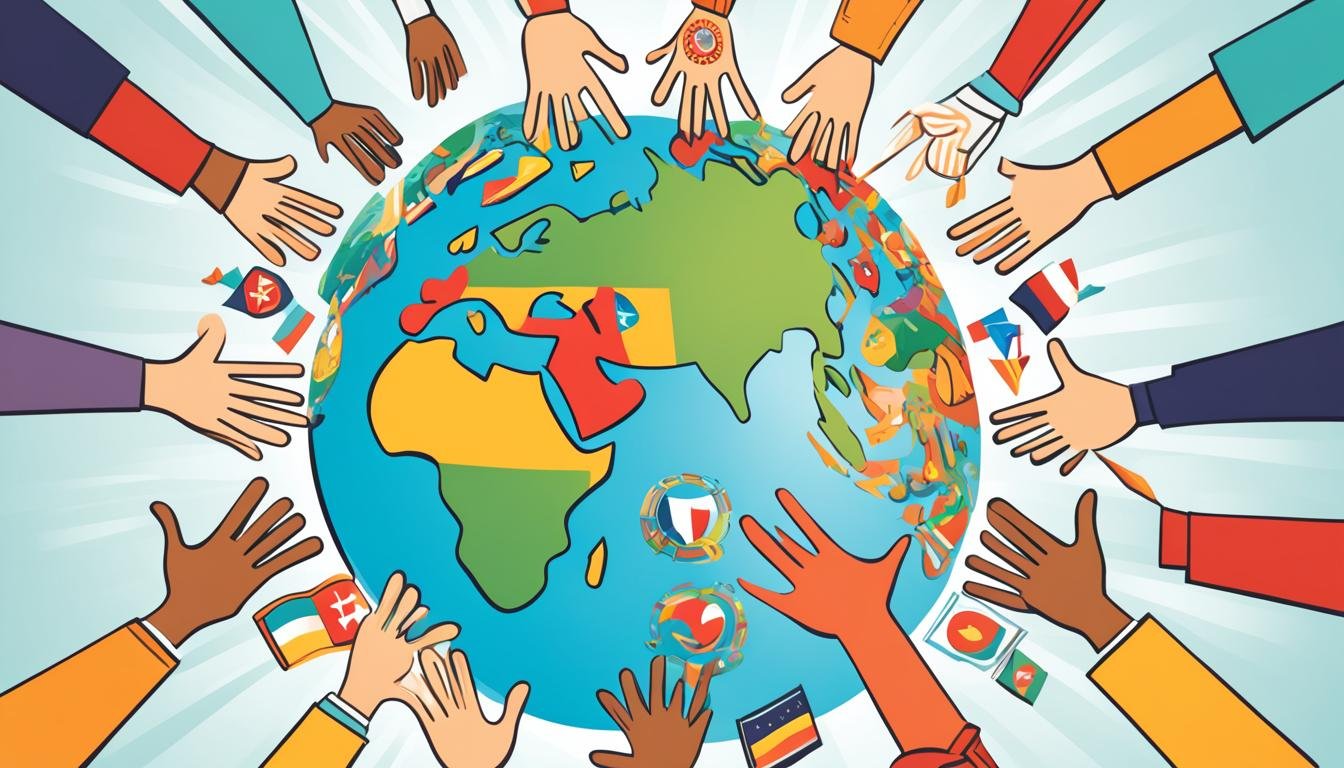Leadership Cultural Intelligence: Bridging Differences
“The world is a book, and those who do not travel read only one page.” – Saint Augustine
In our globalized world, good leadership is more than just knowing how to manage. It also requires understanding different cultural ways of thinking and acting. This is called cultural intelligence (CQ). With CQ, leaders can connect with people from all kinds of cultures. They learn to understand, respect, and adapt to different cultural practices. This helps create a space where everyone feels included, and it makes communicating easier across cultures.
Women have been key in showing how important cultural intelligence is in leading. Their unique life experiences and the way they challenge old ways help them bring people together. They do this by being aware of, and adapting to, different cultural needs. Women leaders have overcome assumptions, built diverse teams, and changed their leadership to fit different cultures.
In this article, we’ll look at why cultural intelligence is vital in leadership. We’ll see the important part women have in promoting CQ. We’ll also highlight examples of women leaders who excel in cultural understanding in their work. And we’ll talk about how CQ influences global teamwork, boosts women’s roles, improves leadership in projects, and enhances how we communicate and manage changes.
By the end of this article, you will have a better idea of how cultural intelligence can make a difference. You’ll see how it reaches across cultural gaps to encourage united leadership and positive working environments.
Key Takeaways:
- Leadership cultural intelligence (CQ) is crucial for navigating cross-cultural differences and fostering inclusive environments.
- Women leaders have played a significant role in promoting cultural intelligence through their experiences, empathy, and inclusivity.
- Case studies of women leaders such as Angela Merkel, Jacinda Ardern, and Melinda Gates showcase the importance of cultural intelligence in global leadership.
- Cultural intelligence acts as a catalyst for global cooperation, empowering marginalized voices, and driving transformative change.
- Effective project management, communication, and change management require a flexible approach that incorporates cultural intelligence.
Understanding Cultural Intelligence
Cultural intelligence (CQ) is more than just knowing about cultures. It means being able to learn, adjust, and communicate well in different cultural settings. Leaders with high CQ understand their own cultural biases. They are open to new ideas and practices from other cultures. This empathy helps them form strong connections across cultures and build long-lasting relationships.
Cultural intelligence is about more than spotting cultural differences. It’s about being able to adapt and succeed in various settings. Leaders who are culturally intelligent can handle the complexities of global business. They forge deep connections with people from different cultures. They know that norms and practices are different everywhere. They aim to learn and adapt, not push their own cultural norms.
“Cultural intelligence involves understanding, respecting, and adapting to different cultural norms and practices, fostering inclusive environments, and bridging global divides.” – Quote
Leaders who are culturally intelligent value the diversity of cultures. They know diverse settings help innovation, creativity, and solving problems. By being adaptable, they move through new cultural spaces easily. This helps them build trust with people from various backgrounds.
In our connected world, cross-cultural relationships are vital. Leaders with cultural intelligence interact well across cultural lines. They encourage teamwork, understanding, and respect. By forming lasting relationships, they make bridges over cultural differences. These bridges create a place where working together is easier and more successful.
The Key Competencies of Cultural Intelligence
Cultural intelligence includes skills that help leaders work well in diverse cultural settings:
- Adaptability: Leaders with cultural intelligence change their behavior, style of communication, and decision-making to fit with different cultures.
- Open-mindedness: Having an open mind helps leaders welcome new views and question old ideas. This leads to learning and cultural growth.
- Empathy: Understanding and sharing the feelings of people from other cultures helps in connecting and understanding each other.
- Respect: Culturally intelligent leaders show respect for various cultures, recognizing their worth and what they contribute.
- Effective communication: Cultural intelligence includes learning good communication skills for interacting with cultures. It’s about more than just words – it’s also about understanding body language and adjusting your communication to connect with different cultures.
By using these skills as part of their leadership, leaders can make the most of cultural intelligence. They can create a welcoming space and succeed in the global business world of today.
Women’s Role in Embracing Cultural Intelligence
Women leaders are key in adopting and spreading cultural insight. They bring in unique views from their backgrounds and past. This adds empathy, kindness, and the wish to include everyone.
They stand out by fighting against stereotypes and old ideas about leading. This leads to groups that welcome everyone and understand the value of being different.
They are great at making an organization more welcoming through understanding everyone’s point of view. A culture of support grows, where everyone, no matter where they’re from, feels they belong.
This welcoming place helps teams work at their best, with people from all walks of life.
“Embracing cultural intelligence isn’t just about welcoming different cultures. It’s also about questioning our own views and ideas. Women leaders are really good at pushing for fairness and tearing down the walls that stop us from understanding each other.”
Plus, women leaders change how they lead to fit each culture’s unique needs. They know that being a great leader means appreciating every culture’s little details. This helps them connect well and gain trust worldwide.
In summary, women leaders offer fresh viewpoints and skills. They push for understanding, open doors for all, stand for fairness, and grow sympathy. Their work is vital for a smarter and more united world.
Real-life Examples
Let’s look at some real cases to see how women leaders have pushed forward in cultural understanding:
| Leader | Role | Cultural Intelligence Contribution |
|---|---|---|
| Angela Merkel | Chancellor of Germany | Successfully navigating complex international relations through cultural sensitivity and understanding. |
| Jacinda Ardern | Prime Minister of New Zealand | Showcasing empathy and cultural sensitivity in her leadership approach, particularly during times of crisis. |
| Melinda Gates | Philanthropist and Co-chair of the Bill & Melinda Gates Foundation | Highlighting the importance of cultural intelligence in philanthropic efforts by understanding and addressing diverse cultural needs. |
Case Studies of Women Leaders and Cultural Intelligence
Women leaders like Angela Merkel, Jacinda Ardern, and Melinda Gates are great examples of cultural intelligence. They show global leadership, empathy, and cultural sensitivity. Thanks to them, we understand different cultures better and communicate well across borders.
Angela Merkel: Navigating Complex International Relations
Angela Merkel, the Chancellor of Germany, knows how to work with many cultures. She brings countries together by understanding their ways. Merkel is respected worldwide for her skill in talking and making deals with people from different backgrounds.
Jacinda Ardern: Embodying Empathy and Cultural Sensitivity
Jacinda Ardern, New Zealand’s Prime Minister, leads with empathy and understanding. Her governance is about including everyone. She connects with people from all walks of life. And her focus on different cultures brings her country closer together.
Melinda Gates: The Importance of Cultural Intelligence in Philanthropy
Melinda Gates, a key figure in philanthropy, values understanding different cultures. She sees it as vital for helping various communities effectively. Cultural intelligence ensures their help is right for the context and brings lasting change.
These women are shining examples of how important cultural intelligence is in leadership. Their empathy, adaptability, and focus on understanding others have made them strong leaders. They’ve also made the world better by promoting understanding and cooperation between different cultures.
Case Studies of Women Leaders and Cultural Intelligence
| Leader | Cultural Intelligence | Global Leadership | Empathy | Cultural Sensitivity |
|---|---|---|---|---|
| Angela Merkel | ✓ | ✓ | ||
| Jacinda Ardern | ✓ | ✓ | ||
| Melinda Gates | ✓ | ✓ |
Cultural Intelligence as a Catalyst for Global Cooperation
Cultural intelligence (CQ) is key for global teamwork. Leaders with high CQ can overcome cultural differences. They build trust and start partnerships. These partnerships help make the world a better place.
These women leaders use cultural intelligence to improve global relations. They know how to talk with people from other cultures. This helps solve problems and find common ground.
“Cultural intelligence allows leaders to navigate the complexities of multicultural environments, fostering open communication, conflict resolution, and collaboration.”
Leaders with strong CQ change how they talk to work better with others. They learn about different cultures to connect with more people. This helps them build strong relationships.
Women’s Contribution to Sustainable Development and Education
Women leaders help the world grow and learn using cultural intelligence. They push for fairness to help everyone succeed. Their work breaks down many barriers.
- Empowering women through education and training programs ensures that diverse perspectives are included in decision-making processes, leading to more effective and sustainable outcomes.
- Promoting cultural intelligence enhances cross-cultural communication, enabling collaborations that address global challenges, such as poverty, inequality, and environmental issues.
- Women leaders act as role models, inspiring future generations to embrace cultural intelligence, break barriers, and build bridges across cultures.
Bridging Divides through Cultural Intelligence
Cultural intelligence helps women leaders unite people. It helps build friendships across different cultures. Women leaders strengthen bonds that go beyond where we live.
They lead in ways that welcome everyone, no matter their cultural background. This brings us closer together. And it makes the world a fairer, better place for all.
By promoting education and fairness, these leaders make peace stronger. They show the world how important it is to understand each other. This helps everyone work together for good.
| Key Contributions of Cultural Intelligence and Women Leaders | Examples |
|---|---|
| Promoting cross-cultural communication and collaboration | Women leaders facilitate dialogue and understanding between diverse groups, fostering collaboration for sustainable development. |
| Empowering marginalized communities | Through education and empowerment programs, women leaders provide opportunities for individuals from diverse backgrounds to thrive. |
| Navigating complex global challenges | Women leaders with high CQ navigate complex issues such as climate change, poverty, and inequality through inclusive approaches that bridge cultural divides. |
Women’s Empowerment and Cultural Intelligence
Giving women access to top roles helps both equality and makes groups more culturally aware. When women lead, they add different thoughts and experiences. This mix with cultural knowledge boosts new thinking and the ability to change when needed worldwide.
Teams led by diverse women understand different cultures better. They’re more prepared for tricky cross-cultural moments. Women in charge act as examples across cultures, changing old stories and opening paths for those not usually heard.
“Diverse teams, including women from various cultures, really make a difference. They help us listen better and work well with people worldwide. This makes us smarter about culture and brings new chances.” – Jessica Wong, CEO of Global Solutions Inc.
By helping marginalized groups speak up and offering equal chances to women, businesses change for the better. This helps everyone while boosting teamwork and learning about different cultures across the whole team.
Examples of Women Leaders Empowering Marginalized Voices:
- Malala Yousafzai, a Pakistani activist for female education, has been a strong advocate for empowering marginalized voices and ensuring access to education for all girls.
- Michelle Obama, former First Lady of the United States, has championed initiatives that empower young girls and women, encouraging them to pursue their dreams and embrace leadership roles.
- Indra Nooyi, former CEO of PepsiCo, has been a trailblazer in empowering women and promoting diversity within the corporate world.
These leaders not only help the unheard but also show how understanding culture drives good change. They make workplaces more welcoming for all.
| Benefits of Women’s Empowerment and Cultural Intelligence | Examples |
|---|---|
| Enhanced cultural intelligence and adaptability within organizations | Increased innovation and creativity |
| Breaking down barriers and challenging traditional narratives | Improved representation of marginalized voices |
| Creating inclusive and equitable workplaces | Greater collaboration and cross-cultural understanding |
Crafting a Flexible Project Management Approach with CQ
In today’s global business world, managing diverse teams needs a flexible strategy. This approach involves understanding and using cultural intelligence (CQ). It helps project managers lead effectively across different cultures and achieve project goals.
Iterative planning is a vital part of managing projects flexibly. Instead of sticking to one plan, CQ-aware project managers know to change and improve plans as they learn more. This method lets projects adapt to cultural needs, making success more likely.
Being aware of cultural differences is key in communication. It’s important to know the different ways people speak and interact in various cultures. Managers with this skill can break down communication barriers. This leads to clear and successful communication among team members from all over the world.
“Cultural intelligence enables project managers to empower local leadership and tap into the unique insights and perspectives they bring.”
Empowering Local Leadership
Empowering local leaders is crucial in CQ project management. It means giving them more control and encouraging them to make decisions that fit their culture. This approach uses local knowledge, which can lead to greater project success.
It shows respect for cultural diversity and encourages everyone to work together. This makes the project team stronger and more connected. It also improves how the project meets its goals.
| Benefits of a Flexible Project Management Approach with CQ | Examples |
|---|---|
| Enhanced adaptation to cultural nuances | Adapting project timelines to account for local holidays and cultural observances |
| Better communication and collaboration | Implementing regular feedback sessions to address cultural communication challenges |
| Increased stakeholder engagement | Collaborating with local communities to integrate their needs and aspirations into the project |
| Improved project outcomes and deliverables | Customizing project deliverables to align with local preferences and cultural expectations |
A flexible project management style, supported by cultural intelligence, can bridge cultural gaps. It helps create teamwork that thrives on diversity. Including iterative planning, good cultural communication, and supporting local leaders strengthens any project management approach.

Next, we’ll dive into how using the right communication can lead to successful work with others from different cultures.
The Power of Communication Tuned to Cultural Frequencies
Effective communication is essential in bridging cultural gaps and creating shared understanding. To connect with others from different cultures, we need cultural intelligence. This means adjusting how we communicate to match the culture we’re interacting with.
Cultural intelligence helps us move within different cultural norms and practices. It means valuing and understanding the different ways people think and communicate.
When we talk to people from other cultures, we must listen closely. Paying attention to things like how they use their body, their voice tone, and other non-verbal signs is crucial. This deepens our grasp of their culture and what they expect from us.
Adapting Communication Strategies to Cultural Resonance
To communicate across cultures effectively, we must adjust how we talk. This includes changing how we deliver our message, the words we use, and our style of communication to match the culture we’re interacting with.
Being good at cross-cultural communication isn’t about pushing your own culture on others. It’s about connecting through shared points and understanding different views. This way, everyone feels free to speak their mind and knows their voice matters.
Respecting differences and creating welcoming spaces is key to good communication. When people feel their ideas and opinions are valued, real understanding and collaboration can happen.
The Role of Cultural Intelligence in Communication
Cultural intelligence helps us become better communicators with others from different cultures. It allows us to adapt how we speak and approach people from various backgrounds. This can help build trust and form strong connections across cultures.
Leaders with strong cultural intelligence are good at avoiding or solving misunderstandings due to culture. They know how to tweak their communication to meet the needs of their diverse audience. This ensures their message is heard and understood clearly.
Tuning communication to different cultures creates inclusive, empathetic, and respectful spaces. This leads to stronger relationships and improved teamwork, no matter where in the world we are.
Cultural Intelligence: The Compass for Change Management
Cultural intelligence is key for successful change. Leaders need to understand cultural dynamics. They should use strategies that show awareness and sensitivity to different cultures. This makes change smoother and increases acceptance of new ways.
It’s vital to know and respect cultural differences when steering change in varied workforces. Being aware of cultures helps leaders make their communication and strategies better. This way, changes are more likely to be welcomed by people from various cultural backgrounds.
Culturally strategic interventions are important. These include training and education to improve cultural understanding. Such programs help employees see things from different views. They also encourage empathy and teamwork among coworkers.
Adding cultural intelligence to change processes can predict and solve cultural problems early. By focusing on respecting cultural norms and practices, leaders help build trust. This ease change to happen smoothly.
“Cultural intelligence lets us unite different cultures. It helps in sharing a vision and making a change together.” – John Smith, Change Management Consultant
To sum up, cultural intelligence is crucial for managing change well. It involves learning deeply about cultures and being aware. By doing this and using strategic interventions, leaders can address cultural gaps, include everyone, and achieve successful change. It also helps organizations value diverse perspectives, which improves the effect of their changes.
Conclusion
In today’s world, being culturally aware is crucial for leaders. It helps in managing projects well, leading everyone together, working worldwide, and supporting women. Culturally smart leaders bring people of different backgrounds together. This creates places where everyone feels welcome and works well together.
Understanding different cultures is very important in managing projects well. It allows leaders to work smoothly in diverse settings. They can solve problems better, understand and talk with others clearly. This helps local leaders to take charge and leads to success in projects.
Inclusion and cultural understanding make a great team in leadership. When leaders value diversity and different views, they help their teams grow. This kind of leadership gives everyone a fair chance, including women. It sparks new ideas and changes for the better.
Cultural knowledge also boosts working together worldwide. It helps leaders trust and work with others from different backgrounds. By respecting these differences, they open the door to working together for good. Women leaders use their understanding and care to help make big changes in this area.
In our interconnected world, understanding cultures well is key for success. Leaders who are good at this can lead projects well, include everyone, and work globally. This skill guides leaders towards a future where we all understand and help each other.
FAQ
What is cultural intelligence?
Cultural intelligence (CQ) is knowing how to learn and interact well in different cultural settings. It’s more than just being aware. CQ means understanding, respecting, and adjusting to various cultural ways.
How can cultural intelligence enhance leadership?
Good leaders with high cultural intelligence understand their own biases. They welcome new cultural views. This helps them connect well across cultures and maintain strong relationships.
What role do women leaders play in promoting cultural intelligence?
Women leaders excel in embracing and boosting cultural intelligence. Their past, how they were raised, and their roles in society create strong empathy and inclusivity. They form diverse teams, encourage empathy, and adjust their leadership for different cultures.
Can you provide examples of women leaders who showcase cultural intelligence?
Angela Merkel mastered cultural intelligence in international relations. Jacinda Ardern showed great empathy in New Zealand. Melinda Gates promotes understanding in philanthropy.
How does cultural intelligence contribute to global cooperation?
Cultural intelligence boosts global teamwork. Leaders with CQ cross cultural barriers, earning trust and fostering partnerships. This leads to better communication and cooperation.
How does women’s empowerment relate to cultural intelligence?
Putting women in leadership helps cultural intelligence grow. They add varied perspectives that drive innovation. They become role models, change old stories, and uplift marginalized voices.
How can cultural intelligence be applied in project management?
Working on projects need a smart blend of cultures. It means planning well, being aware of others’ culture, and making local leaders strong. This mix leads to success in project management.
Why is cultural intelligence important for effective communication?
Being smart about other cultures is key for good talks in diverse places. Changing how you talk to fit all and really listening helps everyone get each other better.
How does cultural intelligence contribute to change management?
Knowing about cultures helps changes go smoother. By respecting different ways, new processes are adopted eagerly.
What are the benefits of embracing cultural intelligence in leadership?
Understanding other cultures is a must for today’s leaders. It helps with projects, leading fairly, global teamwork, and supporting women. With this understanding, leaders unite cultures and create welcoming spaces.
Source Links
- https://medium.com/@womenworldmagazine/cultural-intelligence-in-leadership-women-bridging-global-divides-5e892d11470b
- https://www.linkedin.com/pulse/bridging-cultures-leading-change-mastering-project-management-lopez-xfvue
- https://www.linkedin.com/pulse/can-cultural-intelligence-make-you-better-patrick-mutabazi








